Exploring the Possibilities of Pergolas
A pergola is an outdoor building with an open roof structure. There are usually aluminum pergola and PVC pergola, etc. It may be used for both home and commercial purposes.
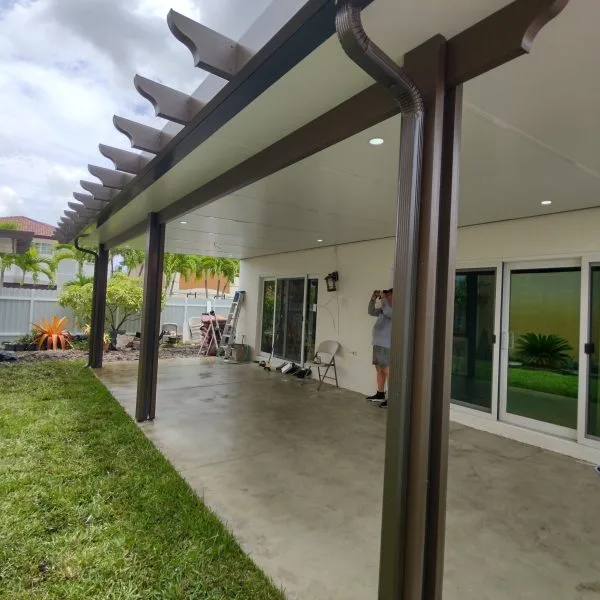
For example, in home usage:
1. barbecue area: a pergola provides an ideal outdoor space for barbecuing and outdoor cooking. You can set up your grill under the pergola and enjoy a meal with your family and friends in a cozy environment.
2. Café: The pergola can create a cozy café area. You can set up tables and chairs under the pergola and enjoy early morning coffee or afternoon tea, creating a pleasant and relaxing atmosphere.
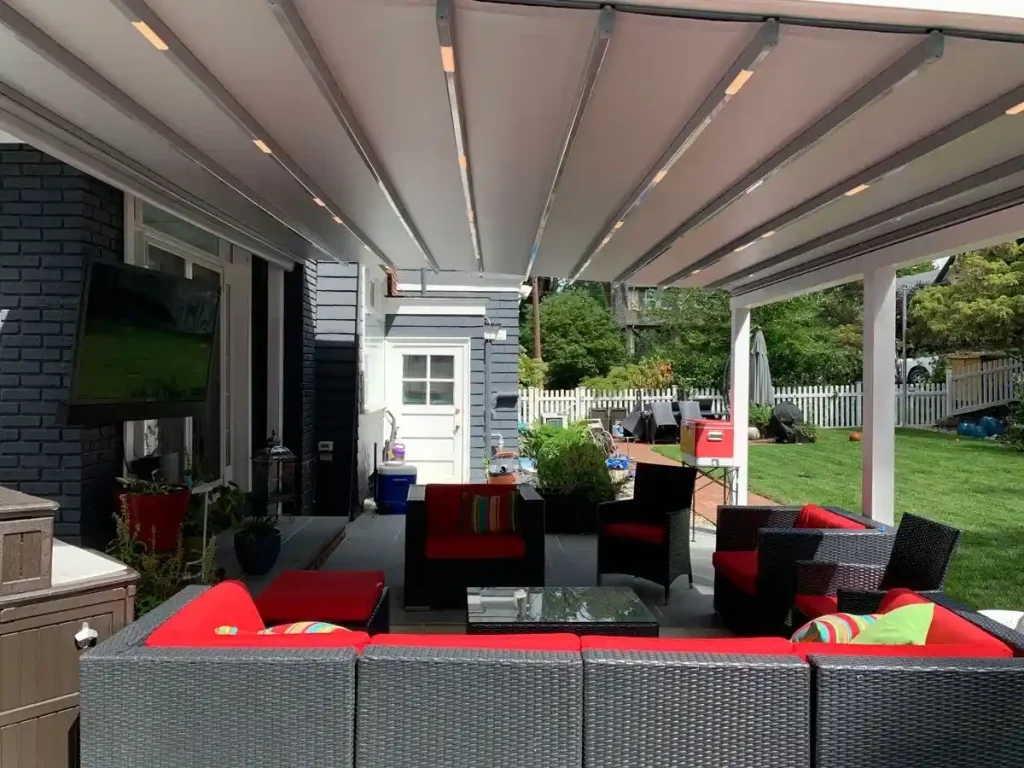
3. Pool Party: The pergola can be used as a shade structure to provide a shady lounge area by the pool. You can place lounge chairs, outdoor furniture, or a lounge area under the pergola for people to relax and socialize after a swim.
A pergola can create a way for you to live closer to the outdoors. It provides you with a shaded outdoor space for a variety of outdoor activities such as reading, lounging, enjoying the garden or playing with your family.
Commercial Uses
1. restaurant terrace: a pergola is often used as an alfresco dining area in restaurants and cafes. It provides a comfortable outdoor environment for diners and creates a special place for businesses to attract customers.
2. Café Lounge: A pergola can be used to create an outdoor café lounge area for customers to enjoy coffee and refreshments outdoors. This environment is often seen as an ideal place to relax and socialize.

3. hotel courtyard: pergolas can be used to decorate a hotel courtyard or garden, providing guests with an attractive outdoor lounge space suitable for relaxing, reading or socializing.
4. Smoking area: In some commercial establishments, pergolas can be used as a designated smoking area, providing smokers with a comfortable outdoor area while avoiding the effects of smoke on indoor spaces.
Pergolas such as aluminum pergola, provide shade and comfort for outdoor activities, creating an environment close to nature.
Pergola Construction and Materials
Construction
There are two types of pergolas depending on their construction: free-standing types and building-dependent types, but they all consist of a main body + roof.
1. Main body (columns and beams): The construction of a pergola is usually supported by columns. The columns can be freestanding, fixed to the ground, or dependent on a building or wall.
The crossbeams are horizontal structures that connect the posts and are used to support the roof of the pergola. The spacing of the crossbeams can be determined by personal design and preference and is usually evenly spaced.
2. Roof: The roof structure of a pergola can be chosen according to individual needs. Common roof designs include flat, gabled, triangular and pitched roofs. Roofs can be open to allow sunlight to pass through, or you can choose shading materials, and there are also removable structures that provide both shade and enjoyment of the sun, as will be mentioned later.
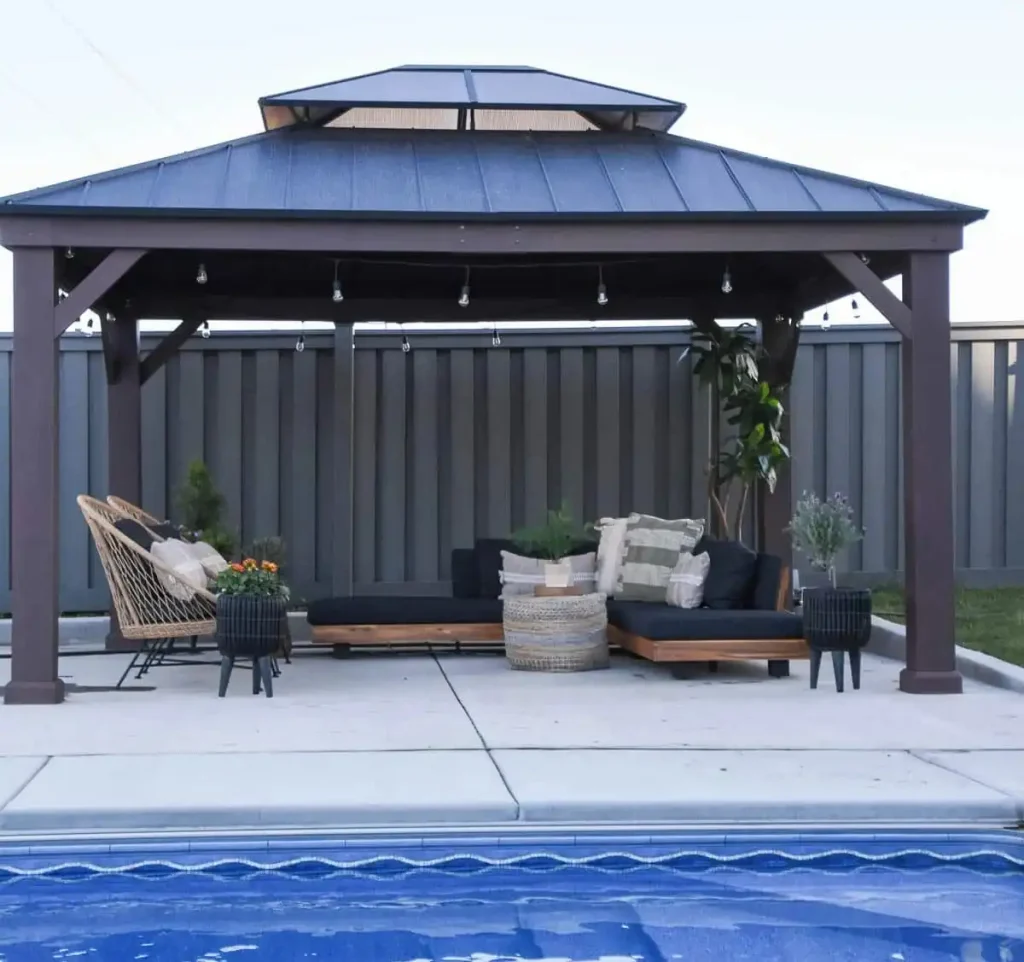
In addition to the post + roof structure, pergolas can also have additional decorations and features. Depending on personal preferences and needs, pergolas can add such things as side shelters, curtains, lighting fixtures, and vines and plants for added aesthetics and practicality.
Material Comparison
1.Wooden pergola: Wood is one of the more commonly used pergola materials. Wooden pergolas give a natural, warm feeling and can blend well with the outdoor environment. However, wood has its own disadvantages.
Wooden pergola is more likely to mold and needs regular maintenance and antiseptic treatment to extend its service life and keep it beautiful. The price of wood has a very big price difference according to the type of wood, common wood includes pine, redwood, cedar, etc. You need to carefully screen when shopping for a wooden pergola.
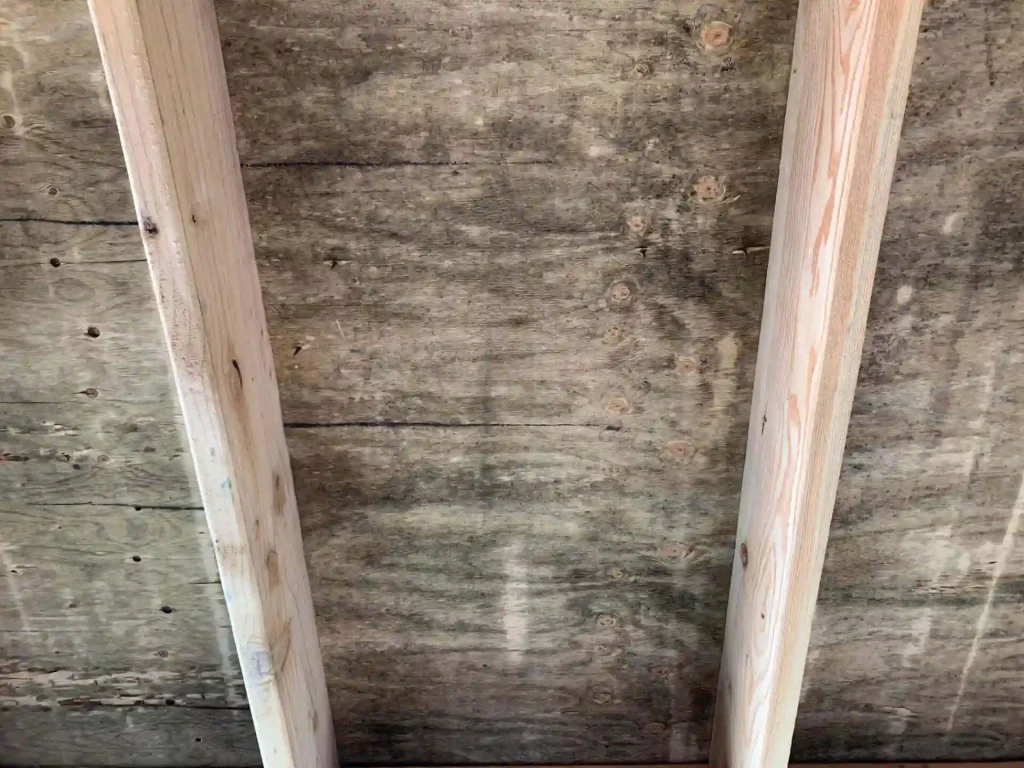
2. PVC or Plastic: Pergolas made of PVC or plastic materials are waterproof and easy to clean. These materials are usually more affordable. They can mimic the look of wood or metal, offering a wide selection of colors and textures.
However, PVC materials may be less suitable in windy and cold temperatures because it may not be strong and durable enough. Because PVC material does not last well outdoors, it is susceptible to sunlight, rain, and snow. After years of use, it may crack, yellow, and become brittle, and needs to be inspected from time to time to ensure safety.
3. Metal: Metal materials such as iron and aluminum are also commonly used in the construction of pergolas. Iron pergolas are usually strong and durable and are suitable for use in situations where more structural support is required.
Aluminum pergola, on the other hand, is lighter, corrosion-resistant, and suitable for use in humid environments such as seashores. Aluminum pergolas are generally chosen for home use because they are lighter in weight, easier to install and less prone to rust, and better maintained than iron pergolas.
Advantages of Aluminum Pergola
Aluminum pergolas are available in different styles and colors, and can also be retrofitted with patio fencing to ensure an integrated and aesthetically pleasing patio. Compared to other materials such as steel, aluminum pergola is much lighter and easier to install and move, and also has enough structural strength in use to withstand outdoor erosion in different climatic conditions.
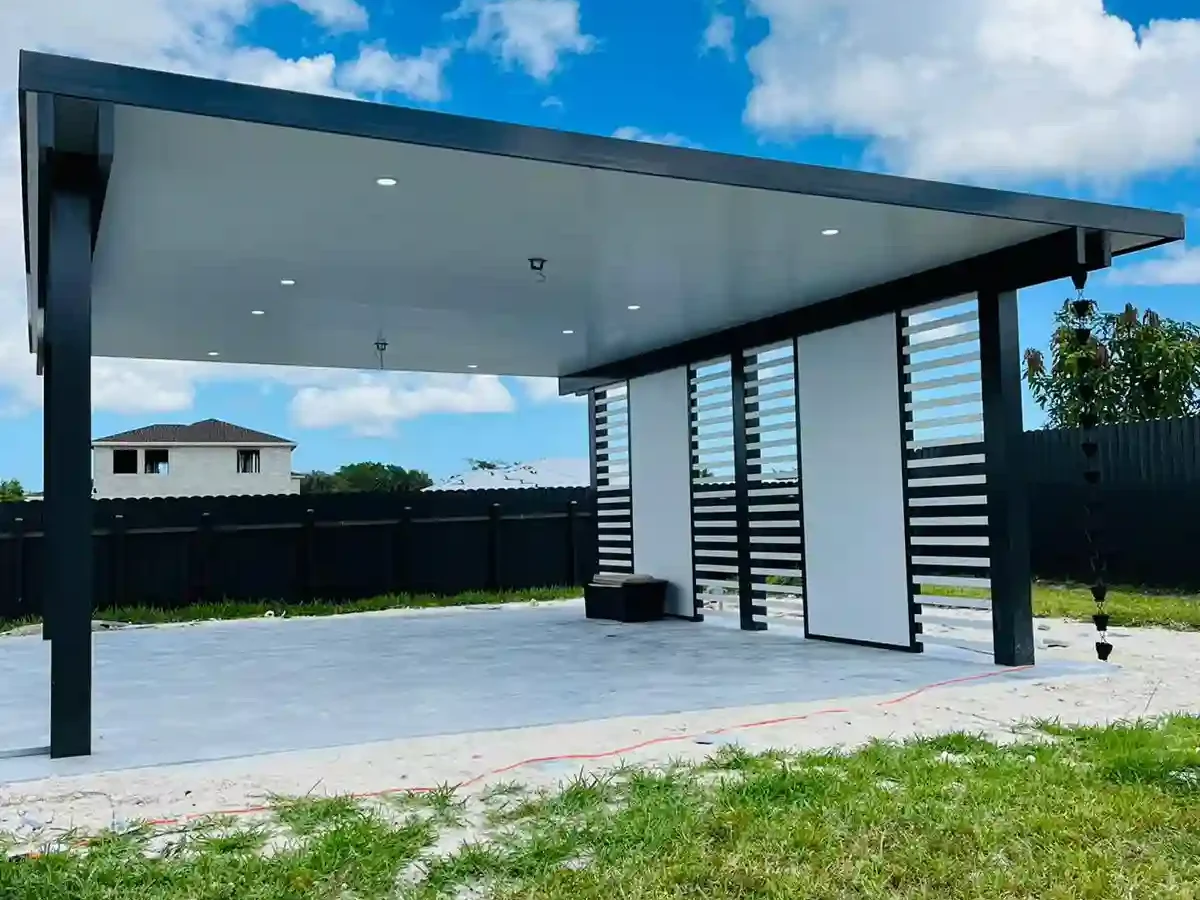
Furthermore, aluminum has excellent corrosion resistance and is not affected by oxidation, rust or corrosion. This makes aluminum pergolas ideal for outdoor environments, able to withstand wet, humid and changing weather conditions without damage.
Over the long term, aluminum pergolas are the easiest as well as the least expensive to maintain. Because aluminum is inherently weather resistant, aluminum pergolas do not require frequent painting or protective treatments, but only regular cleaning to maintain their appearance and performance, saving time and energy.
Of course the appearance is also a point that everyone pays more attention to when installing a pergola. Aluminum is available in a wide variety of shapes, and aluminum panels and coils are easy to cut and processed to provide a modern, minimalist and stylish look that adapts to a variety of design styles for outdoor spaces.
Aluminum pergolas can also be customized to suit individual needs, including size, shape and design style. Whether it’s a small deck, a large garden or a commercial outdoor lounge area, aluminum pergolas can be customized to fit the space’s requirements for optimal shade and aesthetics.
In terms of color, aluminum can be treated by spraying or powder coating. When made into colored aluminum, the corrosion resistance of the aluminum material is effectively enhanced, and it is not easy to lose color. A wide range of color and surface texture options are available to meet a variety of different aesthetic needs.
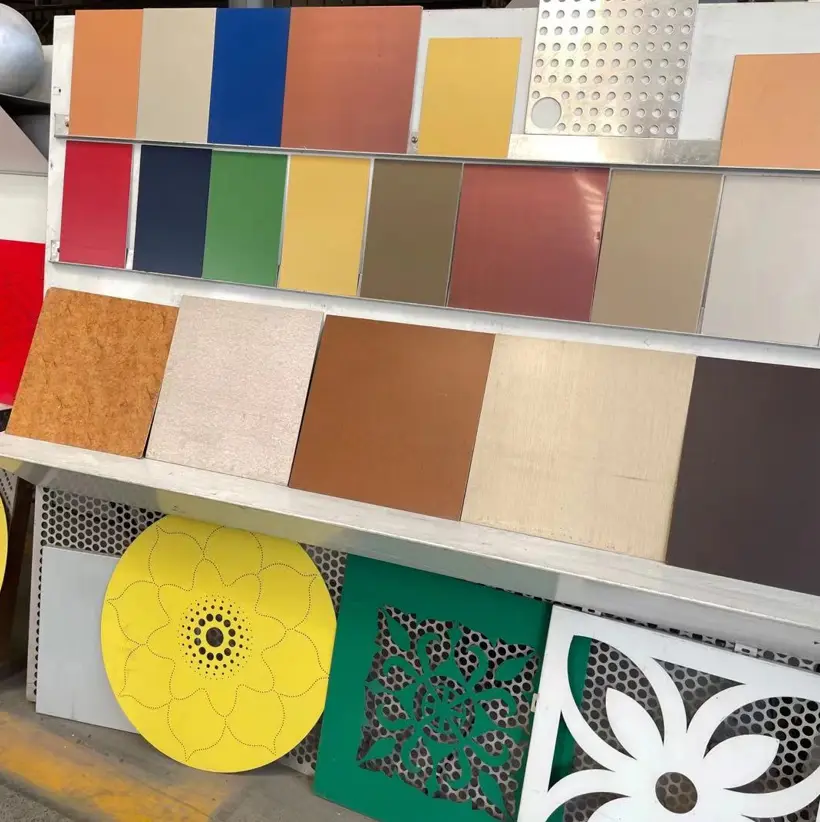
Environmentally sustainable: Aluminum, a recyclable material that can be recycled and reused, reducing the consumption of natural resources. Choosing aluminum pergola helps reduce environmental impact and is in line with the concept of sustainable development.
Aluminum Roll-Up Pergolas: Meet All Your Needs
The traditional aluminum pergola offers a variety of advantages, but due to the impermeable nature of the metal material, you may be concerned that you won’t be able to enjoy the sunshine inside the aluminum pergola, which is certainly unacceptable to those who are looking forward to enjoying their leisure time in the sunshine, but don’t worry, there is a brand new option for aluminum pergola in addition to using the aluminum panels as the roof-Roller pergola roof. This may turn your imagination of pergola upside down.

It’s a retractable roof design that can be opened or closed as often as needed, operated by a manual or electro-mechanical system that allows you to adjust how much the roof opens and closes depending on the weather or your personal preference. When shade or protection is needed, the roof can be closed completely to provide sun and shade. And when sunlight and natural light need to be enjoyed, the roof can be opened fully or partially.
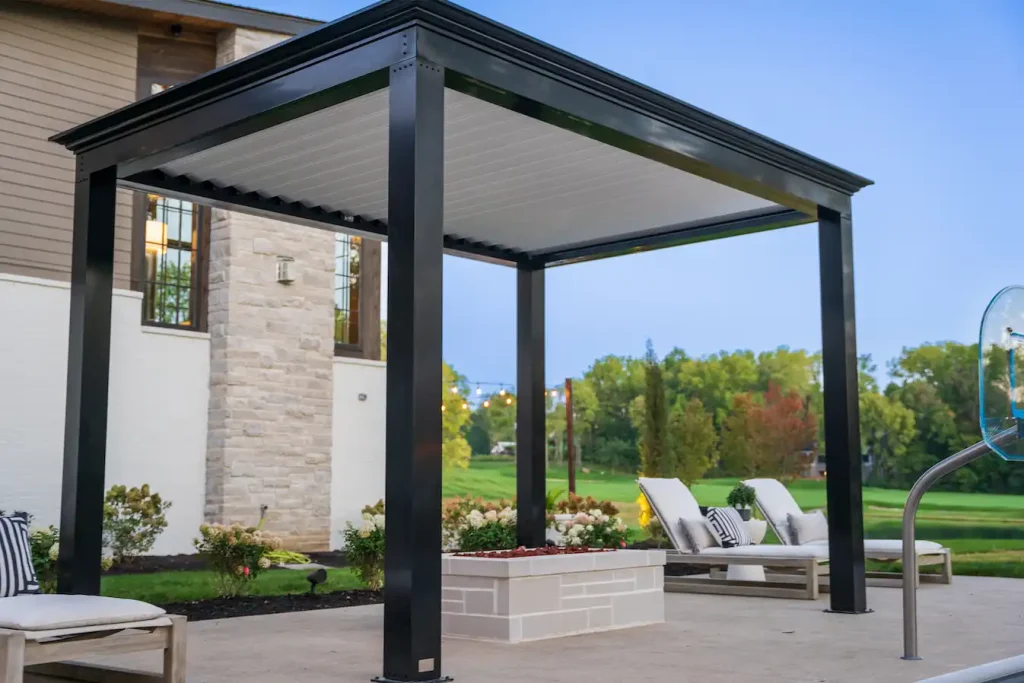
With the same durable and easy-to-clean materials of aluminum, roll-up aluminum roofs can withstand a wide range of weather conditions. The method of operation is also simple. Manual operation or motorized drive are both possible. Manual operation is usually accomplished by means of a rope, handle or crankshaft that requires manual turning.
Electric operation, on the other hand, uses an electric motor and switch that can be used to control the opening and closing of the roof via a remote control or switch button.
Installation and Maintenance: Installation of roll-up aluminum roofs usually requires a professional to ensure structural soundness and operational flexibility.
Regular cleaning and maintenance are also important to keep your roof functional and looking great. Shading materials are washed regularly to ensure they are clean and prevent dust buildup.
In terms of design style, because of the superiority of aluminum materials, such as ease of cutting and painting, you can make aluminum sheets or aluminum coils into any form you want, as long as you choose the right supplier, ensure the quality of the material, and select the right aluminum series.
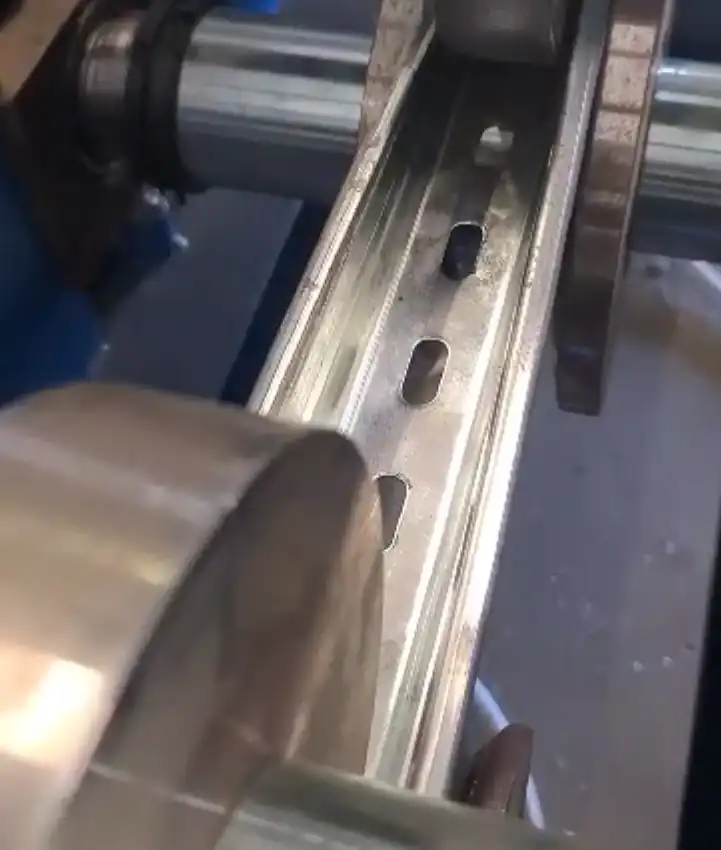
Aluminum Material Selection
Aluminum pergola are typically manufactured using either 5000 series or 6000 series aluminum, the exact aluminum series used will vary depending on the design and requirements of the pergola.
In the 5000 series, the most common aluminum alloys are 5052 and 5083. 5052 aluminum alloy has good corrosion resistance and malleability, and is suitable for manufacturing panels or shells for roll-up aluminum roofs. 5083 aluminum alloy has higher strength and corrosion resistance, and is suitable for large roll-up aluminum roofs that require higher structural strength.
Within the 6000 series, the most common ones are 6061 and 6063 aluminum alloys, which offer good mechanical properties and machinability for frames and structural components of roll-up aluminum roofs. 6063 is commonly used for small to medium-sized roll-up aluminum roofs, while 6061 is typically used for larger roll-up aluminum roofs or those that require higher strength.
The choice of which aluminum alloy series to use depends on the design requirements of the roll-up aluminum roof, the size, the budget, and the weathering requirements of the environment in which it is located. Manufacturers and designers need to consider all of these factors to select the right aluminum alloy series to meet the functional and performance needs of roll-up aluminum roofs.
Understanding the Differences in Aluminum Alloys
In general, aluminum and its alloys have strong corrosion resistance. Pure aluminum, commercially known as 1xxx aluminum, has the highest level of corrosion resistance in its natural state.
In order to achieve the desired performance in various commercial aluminum alloy groups, the factory adds specific alloying elements to the manufacture of aluminum that give the metal specific properties such as strength, ductility, weldability, machinability, corrosion resistance, etc. As shown in the following form:
| Alloy Group | Major Alloying Element | Strength | Ductility | Corrosion Resistance | Weldability | Anodizing |
| 1xxx series | None | Low | High | High | High | High+ |
| 2xxx series | Cu | High+ | Low | Low | Low | Low |
| 3xxx series | Mn | Low+ | High | High | High | High |
| 5xxx series | Mg | Middle | Middle | High | High | High |
| 6xxx series | Si/Mg | Middle | Middle | High | High | High+ |
| 7xxx series | Zn/Mg | High | Low | Middle | Middle | Middle |
1xxx Series Aluminum Alloys: Pure aluminum or commercial pure aluminum with excellent corrosion resistance and electrical conductivity, but relatively low strength and mechanical properties. Mainly used in applications where corrosion resistance and conductivity are critical, such as wires and chemical equipment.
2xxx series aluminum alloy: the main alloying element is copper, which has high strength and heat resistance, but poor corrosion resistance.
3xxx series aluminum alloy: Manganese is the main alloying element of this series. These alloys have good strength, excellent corrosion resistance and moderate formability. They are typically used in applications where corrosion resistance is critical, such as marine components, heat exchangers and chemical processing equipment.
4xxx series aluminum alloy: the main alloying element is silicon, which has excellent flowability, weldability and heat resistance, and is commonly used in welding applications and complex castings.
5xxx series aluminum alloy: Magnesium is the main alloying element of this series. These alloys have good formability, high strength, and excellent corrosion resistance, and they are widely used in a variety of industries, including automotive, marine, and construction applications. Common uses include automotive body panels, hulls, and structural components.
6xxx Series Aluminum Alloys: The main alloying elements are silicon and magnesium, which provide a good balance between strength, formability and corrosion resistance. They are widely used in applications such as extrusion, structural components and automotive parts, and are common general-purpose aluminum alloys.
7xxx series aluminum alloy: The main alloying element is zinc, which has excellent strength and heat resistance, and is suitable for some applications requiring higher strength. Such as aerospace, defense and sporting goods industries.
8xxx series aluminum alloy: the main alloying elements are tin, lithium, with good heat treatment performance and corrosion resistance, known for low density, high strength and excellent fatigue resistance, often used in special applications, such as aerospace applications, to reduce weight and improve structural performance.
It should be noted that the performance comparison of different aluminum alloys is not limited to the characteristics listed above, and the specific properties are also affected by factors such as specific alloy composition, heat treatment and processing technology. When selecting the right aluminum alloy, various performance indicators should be comprehensively considered according to the specific application needs.


